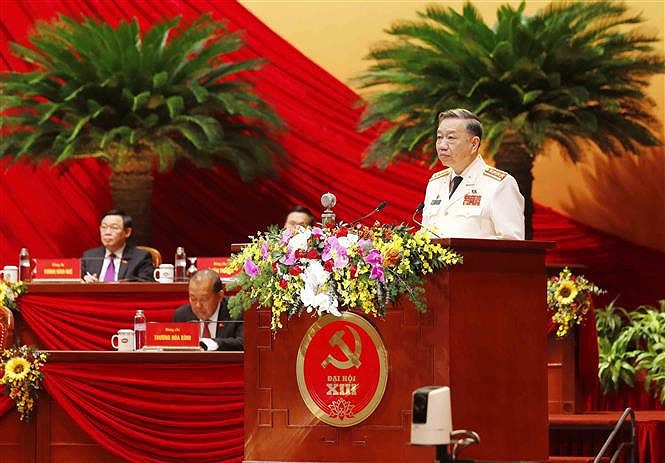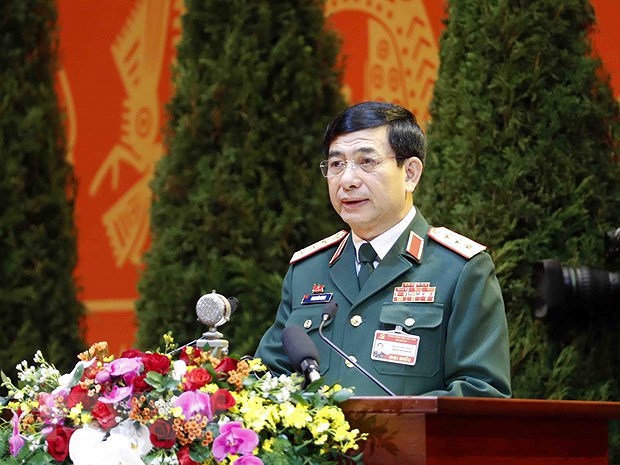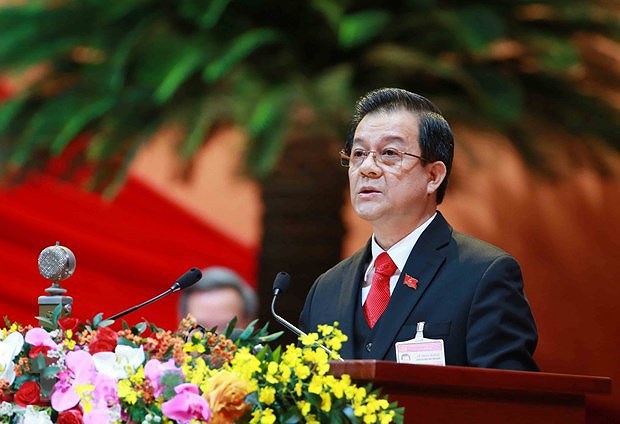 Gen. To Lam, Politburo member, Secretary of the Central Public Security Party Committee, and Minister of Public Security, delivers a speech at the congress on January 27 (Photo: VNA)
Gen. To Lam, Politburo member, Secretary of the Central Public Security Party Committee, and Minister of Public Security, delivers a speech at the congress on January 27 (Photo: VNA)- Leaders of the
Ministry of Public Security, the Ministry of National Defence, and the Supreme
People’s Court on January 27 stressed the importance of comprehensive reform
and the building of a clean and strong public security force, a modern army,
and a civilised and modern judicial sector.
Delivering a speech at the 13th National Party
Congress, Gen. To Lam, Politburo member, Secretary of the Central Public
Security Party Committee, and Minister of Public Security, said that during the
2016-2021 tenure, the people’s public security force did a thorough job of understanding
and forecasting the situation and presenting proposals to the Party and State
to issue and steer the implementation of strategic, fundamental, and long-term
guidelines, policies, and viewpoints about security - order protection and
public security force building.
That helped create a peaceful and stable
environment for socio-economic development, the expansion of external
relations, and improvements to the country’s stature, he noted.
To successfully carry out the content on security
- order protection in the 13th National Party Congress’s resolution, the
Central Public Security Party Organisation and the entire public security force
will thoroughly understand and seriously implement the Party’s guidelines and
policies so as to press on with comprehensive reforms, he went on.
Lam emphasised that the force will keep a firm
grasp of the situation quickly and from afar so as to provide timely advice to
the Party and State on guidelines, solutions, mechanisms, policies, and laws to
protect the national interest, sovereignty, and security; maintain strategic
proactiveness; and strongly bring into play the people’s role in security
affairs.
 Sen. Lt. Gen. Phan Van Giang, member of the Party Central Committee, member of the Standing Board of the Central Military Commission, Chief of the General Staff of the Vietnam People’s Army (VPA), and Deputy Minister of National Defence, addresses the congress (Photo: VNA)
Sen. Lt. Gen. Phan Van Giang, member of the Party Central Committee, member of the Standing Board of the Central Military Commission, Chief of the General Staff of the Vietnam People’s Army (VPA), and Deputy Minister of National Defence, addresses the congress (Photo: VNA)
Speaking at the congress, Sen. Lt. Gen. Phan Van
Giang, member of the Party Central Committee, member of the Standing Board of
the Central Military Commission, Chief of the General Staff of the Vietnam
People’s Army (VPA), and Deputy Minister of National Defence, said that during
the last tenure, the VPA firmly maintained and upheld its nature and traditions
as a heroic, united, proactive, and creative army that has exerted efforts to
weather difficulties and challenges and comprehensively fulfil its duties,
thereby helping to firmly safeguard independence and sovereignty and maintain a
peaceful and stable environment for national development.
He emphasised improvements in awareness,
responsibility, and action in the entire Party, the people, the army, and the policy
system in army building, defence consolidation, and Fatherland safeguarding;
along with the enhancement of the Party’s absolute leadership in every aspect,
as well as the State’s concentrated and united management of the army and
national defence.
Delegates from the VPA’s Party Organisation
proposed that for 2021-2026, the Party should continue leading the army and
relevant forces to improve the VPA’s capacity in forecasting and advising the
Party and State on military and defence affairs to protect the Fatherland in
the new context; identify overall, fundamental, and long-term guidelines and
solutions to dispel any risk of conflict early and from afar and avoid being
caught by surprise in all circumstances; and stay proactive and ready to
effectively respond to non-traditional security challenges, according to Giang.
He also highlighted the need to promote the
building of people-based defence; the association of people-based defence with
people-based security; the combination of ensuring strong defence - security
with economic affairs; the reform and improvement of military training,
education, and science; the development of a self-reliant, resilient, modern,
and dual-purpose defence industry; along with the promotion of substantive
defence diplomacy in order to protect the country’s interests early on and from
afar, and by peaceful means.
The Party should continue its absolute and
direct leadership over the VPA in every respect; build a regular, elite, and
gradually modern army; prioritise the modernisation of certain military
services, arms, and forces to create a solid prerequisite for building a modern
army from 2030; and build a politically strong army that has strong combatant
capacity and is an absolutely faithful and trustworthy political and combat
force of the Party, State, and people, Giang added.
 Le Hong Quang, Vice Secretary of the Party Committee and Standing Deputy Chief Justice of the Supreme People’s Court, delivers a speech at the congress (Photo: VNA)
Le Hong Quang, Vice Secretary of the Party Committee and Standing Deputy Chief Justice of the Supreme People’s Court, delivers a speech at the congress (Photo: VNA)
In his speech, Vice Secretary of the Party
Committee and Standing Deputy Chief Justice of the Supreme People’s Court, Le
Hong Quang, underlined that building a strong and prosperous nation in
association with a civilised and modern judicial sector is an important part of
“Doi Moi” (Renewal).
As stepping up judicial reform is an inexorable trend
in building a law-governed State, the Party Committee of the Supreme People’s
Court proposed several viewpoints and reform tasks for the coming time,
affirming that the court sector is persistent in the principle that the Party
has comprehensive, united, and direct leadership over judicial agencies; that judicial
reform is for the sake of national development; that judicial reform is a
crucial driving force for promoting the quality and effectiveness of judicial
activities and the Party-led corruption fight; and that the judicial sector works
to serve the people.
Proposals include perfecting regulations;
upholding democracy; protecting people’s rights and legitimate interests via
the completion of the people’s assessor institution; completing the mechanism
for monitoring judicial activities for people-elected agencies and the people;
making use of IT development to build smart and e-courts; and placing emphasis on
the position and role of the agencies exercising judicial power in the
political system./.